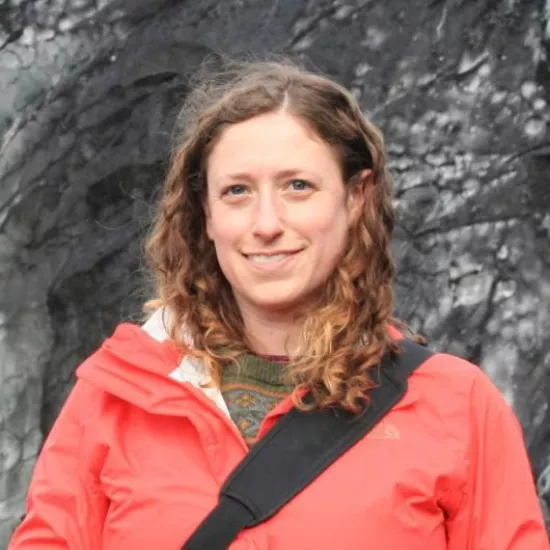
Lea Hirsch
Research Areas:
Discovery and characterization of exoplanets with radial velocity data; Orbits of exoplanets and brown dwarfs; Demographics and occurrence of giant planets; Planets in binary star systems;
Research Profile:
My research interests in astronomy focus on finding and characterizing nearby extrasolar planets - planets orbiting stars other than our own Sun. Using time series spectroscopic observations of stars, I search for the “wobble” in their motion caused by the orbit of a planet - a technique known as the Radial Velocity method. With these data, we can characterize the planets’ masses and orbits, and start to probe the statistics of how common planets are at different sizes and locations in their solar systems.
I am especially interested in the effects of binary star companions on the formation and evolution of exoplanets. Our own Sun is a single star, but approximately half of all nearby stars like the Sun live in binary systems with at least one gravitationally bound companion star. These binary systems are a more dynamic environment for planet formation, and the gravitational influence of the stellar companion can inhibit the formation of planets or destabilize the orbits of planets that are able to form. I try to understand these effects by statistically comparing the occurrence rates and demographics of planets in single vs. binary systems.
One of my favorite things about astronomy is that it allows us to ask (and try to answer) huge, fundamental questions, like: How did the Earth form? Are there other planets like Earth - planets that could potentially sustain life - out there in the universe? In my classes I emphasize not only what we’ve learned about these questions, but also how we can even begin to approach answering them. I use group problem solving and project-based learning to give students the opportunity to think and work like an astronomer, while also gaining valuable computational and statistical skills that can be equally applied in many other fields.
Courses Taught:
AST101H5F, AST201H5S, AST221H5F, AST222H5S
Publications
L. A. Hirsch, L. J. Rosenthal, B. J. Fulton, A. W. Howard, D. R. Ciardi, G. W. Marcy, E. Nielsen, E. A. Petigura, R. J. de Rosa, H. Isaacson, L. M. Weiss, E. Sinukoff & B. Macintosh. Understanding the Impacts of Stellar Companions on Planet Formation and Evolution: A Survey of Stellar and Planetary Companions within 25 pc. The Astronomical Journal. 2021. 161 (134).
L. J. Rosenthal, B. J. Fulton, L. A. Hirsch, H. Isaacson, A. W. Howard, C. M. Dedrick, I. A. Sherstyuk, S. C. Blunt, E. A. Petigura, H. A. Knutson, A. Behmard, A. Chontos, J. R. Crepp, I. J. M. Crossfield, P. A. Dalba, D. A. Fischer, G. W. Henry, S. R. Kane, M. Kosiarek, G. W. Marcy, R. A. Rubenzahl, L. M. Weiss & J. T. Wright. The California Legacy Survey I. A Catalog of 177 Planets from Precision Radial Velocity Monitoring of 719 Nearby Stars over Three Decades. ApJS. 2021.
B. J. Fulton, L. J. Rosenthal, L. A. Hirsch, H. Isaacson, A. W. Howard, C. M. Dedrick, I. A. Sherstyuk, S. C. Blunt, E. A. Petigura, H. A. Knutson, A. Behmard, A. Chontos, J. R. Crepp, I. J. M. Crossfield, P. A. Dalba, D. A. Fischer, G. W. Henry, S. R. Kane, M. Kosiarek, G. W. Marcy, R. A. Rubenzahl, L. M. Weiss & J. T. Wright. The California Legacy Survey II. Occurrence of Giant Planets Beyond the Ice line. ApJS. 2021. In preprint.
S. Blunt, J. J. Wang, I. Angelo, H. Ngo, D. Cody, R. J. De Rosa, J. R. Graham, L. A. Hirsch, V. Nagpal, E. L. Nielsen, L. Pearce, M. Rice & R. Tejada. orbitize!: A Comprehensive Orbit-fitting Software Package for the High-contrast Imaging Community. The Astronomical Journal. 2020. 159 (89).
A. B. Savel, C. D. Dressing, L. A. Hirsch, D. R. Ciardi, J. P. C. Fleming, S. A. Giacalone, A. W. Mayo & J. L. Christiansen. A Closer Look at Exoplanet Occurrence Rates: Considering the Multiplicity of Stars without Detected Planets. The Astronomical Journal. 2020. 160 (287).
R. J. De Rosa, T. M. Esposito, L. A. Hirsch, E. L. Nielsen, M. S. Marley, P. Kalas, J. J. Wang & B. Macintosh. The Possible Astrometric Signature of a Planetary-mass Companion to the Nearby Young Star TW Piscis Austrini (Fomalhaut B): Constraints from Astrometry, Radial Velocities, and Direct Imaging. The Astronomical Journal. 2019. 158 (225).
E. L. Nielsen, R. J. De Rosa, B. Macintosh, J. J. Wang, J. B. Ruffio, E. Chiang, M. S. Marley, D. Saumon, D. Savransky, S. M. Ammons, V. P. Bailey, T. Barman, C. Blain, J. Bulger, A. Burrows, J. Chilcote, T. Cotten, I. Czekala, R. Doyon, G. Duchene, T. M. Esposito, D. Fabrycky, M. P. Fitzgerald, K. B. Follette, J. J. Fortney, B. L. Gerard, S. J. Goodsell, J. R. Graham, A. Z. Greenbaum, P. Hibon, S. Hinkley, L. A. Hirsch, J. Hom, L. Hung, R. I. Dawson, P. Ingraham, P. Kalas, Q. Konopacky, J. E. Larkin, E. J. Lee, J. W. Lin, J. Maire, F. Marchis, C. Marois, S. Metchev, M. A. Millar-Blanchaer, K. M. Morzinski, R. Oppenheimer, D. Palmer, J. Patience, M. Perrin, L. Poyneer, L. Pueyo, R. R. Rafikov, A. Rajan, J. Rameau, F. T. Rantakyro, B. Ren, A. C. Schneider, A. Sivaramakrishnan, I. Song, R. Summer, M. Tallis, S. Thomas, K. Ward-Duong & S. Wolff. The Gemini Planet Imager Exoplanet Survey: Giant Planet and Brown Dwarf Demographics from 10 to 100 au. The Astronomical Journal. 2019. 158 (13).
